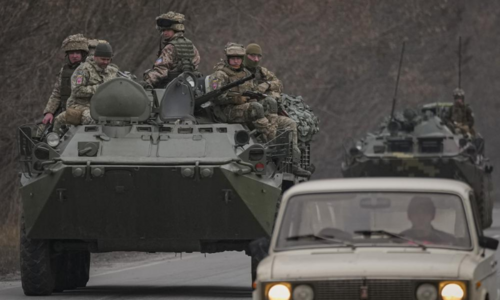UNLESS speedy efforts at de-escalation are made, the crisis in Ukraine has the potential to morph into a catastrophic conflict that will consume Europe. Early on Thursday, Russia launched an invasion of its western neighbour — a move the US and its European allies had been predicting for weeks.
The background behind the hostilities is lengthy, as Cold War-era ghosts have seemingly been revived in a new confrontation pitting the West against Russia. In a nutshell, Russia has not been happy with growing Western overtures towards Ukraine — with Moscow and Kyiv both being former components of the Soviet Union — and had been warning that any attempts to include Ukraine in Nato would entail consequences.
However, the Ukrainian government and its Western supporters had vowed to take their relationship forward. The immediate trigger for the hostilities has been Russia’s intervention on behalf of breakaway pro-Moscow elements in Ukraine’s eastern Donbas region, whom Vladimir Putin claims have been subject to “genocide by the Kyiv regime”.
With regard to Pakistan’s position in this conflict, Imran Khan is the first world leader to meet Mr Putin in the aftermath of the invasion. While the timing of the prime minister’s Russia visit is unfortunate, the prime minister did use the opportunity to express his concern over the situation. Clearly, Pakistan needs to maintain its neutrality. The invasion, and any subsequent military showdown between the West and Russia, will likely reignite the bloc politics of the Cold War, and Pakistan needs to play its cards right and avoid taking partisan positions.
Read: Echoes of the Cold War
Meanwhile, the war rhetoric is menacing. Mr Putin has warned that attempts to take on Russia will be met with an “instant” response while US President Joe Biden has threatened to “hold Russia accountable”. Comparisons are also being made to World War II, in which the Russian people suffered immensely. The prospects are, therefore, grim and chances for a larger conflict strong.
It is true that neither side is without blame here. Russia should not have launched the assault targeting a sovereign country, while the Western side also failed to show maturity and engaged in sabre-rattling where diplomatic foresight was required. Russia should accept that the USSR is history and its former components are free to chart their own destinies, without needing permission from Moscow.
For its part, Nato too needs to shed its Cold War mentality and dispel the impression that it is trying to surround Russia from all sides. Hostilities must be ended forthwith, while a ceasefire needs to take effect. Russia should recall its troops, while the West needs to support de-escalation efforts. Unless a wiser course is taken, a conflict of global proportions cannot be ruled out, with nuclear-armed adversaries trying to flex their muscles in public view. The UN and non-aligned states must act swiftly to prevent a dangerous conflagration.
Published in Dawn, February 25th, 2022















































